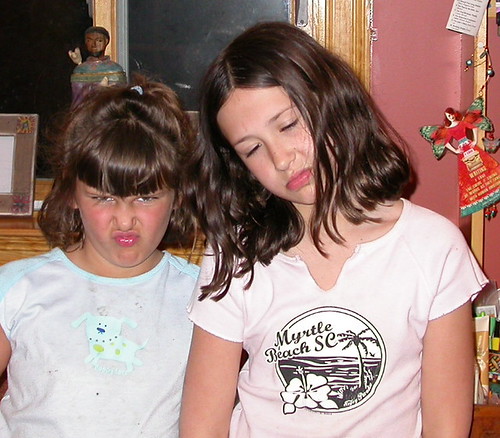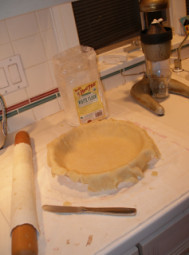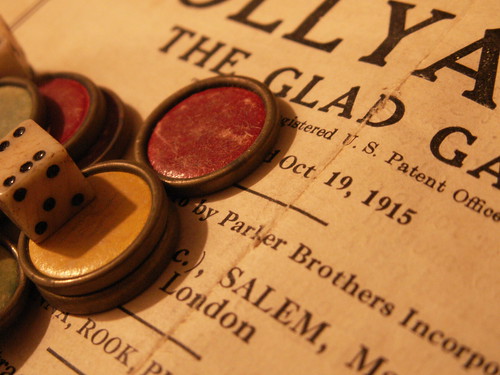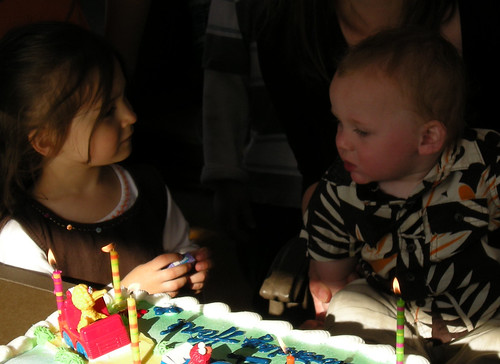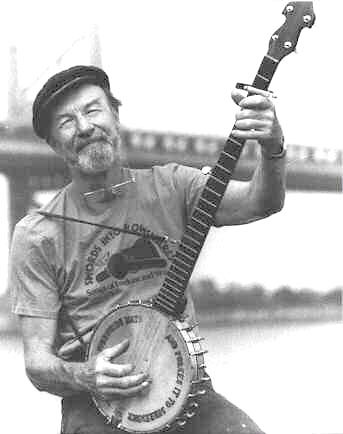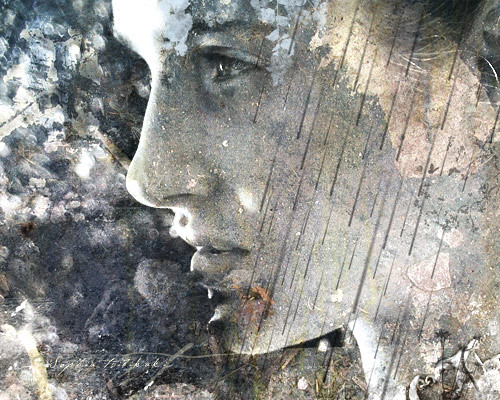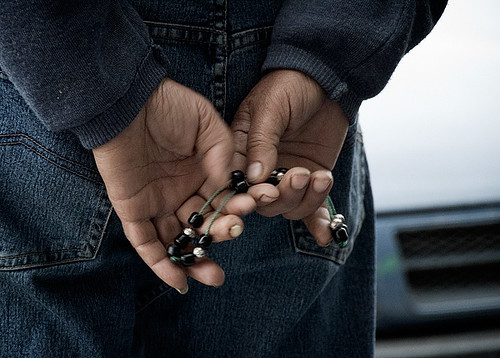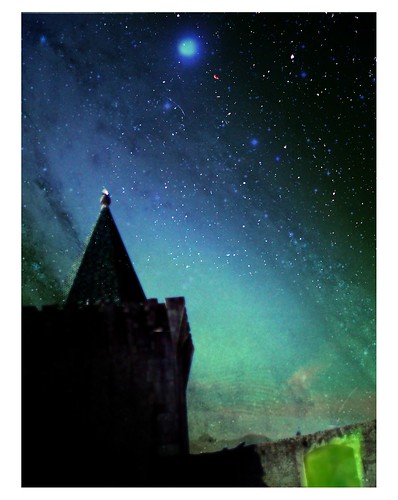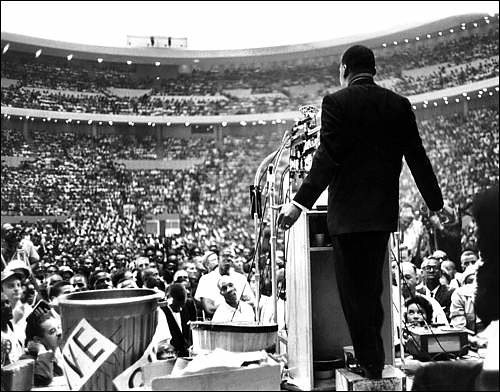You do not need to leave your room. Remain sitting at your table and listen. Do not even listen, simply wait, be quiet, still and solitary. The world will freely offer itself to you to be unmasked, it has no choice, it will roll in ecstasy at your feet. --FRANZ KAFKA
Saturday, August 30, 2008
THE HORRIBLE AND THE MISERABLE
"Life is divided up into the horrible and the miserable. The horrible would be terminal cases, blind people, cripples. The miserable is everyone else. When you go through life you should be thankful that you're miserable."
When I first heard that quote, I was young enough to wake up every day feeling immortal, young enough that I understood Woody’s “misery” well. Misery was a boyfriend who didn’t call, a roommate who ate my leftover lasagna, or a B on a paper, when dammit, I deserved an A. The horrible--those unspeakable tragedies and illnesses that happened to other people--terrified me so much I tried not to think of them.
Thus, Woody’s quote made me laugh nervously and nod inwardly. Now it feels both insensitive and untrue. We're all terminal cases, and nearly every mistake we make in life, every unkindness we do, every squandered moment can be traced to the unspoken belief that we are the Great Exception.
In the first two days after my surgery, I cried more than I have in months--and not from pain. No, I had become the proverbial person who cries at the Hallmark card commercial. I felt an intense solidarity with suffering people everywhere. Their stories weren’t just sad pieces on the news; they felt visceral; they were my story. When two kids from the Cape died in Iraq and Afghanistan died within two days, I cried as if they’d been family.
I wept for my cousin’s husband who has been in a hospital in Kuwait for three months suffering from multiple myeloma. Once a marathon runner who kept himself in perfect shape, he has wasted to nothing, but still possesses an epic will to live. Unable to get comfortable on my bed no matter what position I assumed, I thought of his bed sores and the ache that never leaves his bones, and I wept. I had to turn off a television special about the suffering of Afghan women because their lives invaded my heart, and spilled into my restless dreams that night. But what troubled me most of all was a report about a local injured soldier. I thought of the surgeries, the weeks in hospital beds. Though the reports of poor care at Walter Reed had enraged me when I first heard them, when I thought of them in my post-surgical state, they left me shaking and sobbing.
Are you okay? my nurse said, standing in the doorway.
How could I explain that yes, I was okay, but some crucial filter had broken down? That I had gone over to the side of Woody’s “horrible” category and I couldn’t escape the view?
At around three in the morning, when it was obvious we were both awake, the roommate I hadn’t felt well enough to speak to yet pushed open the curtain that separated us and appraised me. “So who are you over there?”
I told her my name.
“You sure cry a lot,” she said, with the humor and honesty that would go far to transform my hospital stay.
“I guess I do,” I said. I loved that she didn’t ask why. Nor did I feel a need to explain myself.
In the next few days, we would talk a lot and joke even more, especially deep in the endless hospital nights. She had already been in the hospital for twelve days when I arrived and during that time, she’d missed her daughter’s wedding and the birth of her son’s first child. When the nurse checked in on us, she asked her to pass me some photographs from both events; and I couldn’t help noticing how she smiled as I looked at each one.
She'd suffered a lot of complications, but this hadn’t been her worst hospitalization. Twelve years earlier she’d had a frightening bout of myocarditis. While in the hospital, she suffered a stroke that left her short term memory impaired, and then a serious blood clot that necessitated the amputation of her leg. She was thirty-eight years old, and had two young teenagers at home. Her daughter, a freshman in college majoring in accounting, had been so devastated, she dropped out and came home to care for her mother. (Later, she would become a nurse.)
My first reaction was disbelief that so many bad things could happen to one person in a short period of time, but my roommate told her story with an utter lack of self-pity. When she’d gotten home from the hospital, she’d gotten a small dog that was easier to walk with her prosthesis; and as she depended on her husband to help with her memory lapses, their relationship had become something deep and rare. Their religious faith had also grown. In Woody's world, her life would undoubtedly fall in the horrible category, but she clearly didn't see it that way--and neither do I.
Before I left the hospital, the crying that alarmed my family and left me almost unable to watch TV, stopped. My doctor attributed it to the physical, mental, and emotional trauma from such long surgery, but I think it was something else. I think that I had endured a new level of suffering this time, and that it had made me see everyhing and everyone differently. The good news--if there is indeed something possible that comes from this kind of experience-- is that after you've survived horrible , you're far less likely to allow miserable to contaminate a single hour. My roommate, who left the day before I did, grinning with delight at the prospect of meeting her new grandchild and complaining about nothing, proved that.
Monday, August 25, 2008
WHEN DO YOU COMPLAIN?
No one particularly likes a sponge bath, but at the hospital where I underwent my first five surgeries, they made it as pleasant as possible. There was a sweet smelling foamy basin, a soothing back rub with baby lotion, and if I wanted it, that ultimate luxury: a shampoo. A the end of the process, I felt pampered and refreshed.
Thus, I was shocked when an unsmiling aide I’ll call S. showed up to administer my “bath” at my new hospital (a first class institution.) The curtain surrounding my bed still open, she tossed me a wet face cloth, and ordered: “Wash!” A request that she pull the curtain clearly annoyed her, and when that asked for still more, it put her over the edge.
“Soap?” she repeated, as if it were a new concept in bathing. She shuffled out of the room, shaking her head.
I tried to engage S. in conversation, to somehow remind her we were both human, that I understood she hated her job. I, in fact, wasn’t thrilled with my role either. Couldn’t we maybe just be kind to one another?
But S. answered my questions with a grunt, and refused eye contact. After I used her profferred towel, she disappeared without a word.
When Ted came in, he noticed how shoddy her care was even before I mentioned it. She emptied the contents of the foley catheter on top of the bed, and neglected to wear gloves as she moved from one patient to another. The simplest request was met with a glower.
Still, S. and I might have survived each other if I didn’t develop a problem with my pain pump on my second day. When it ceased working, the pain level was intolerable. I pressed my call light, but that wasn’t working either, and my roommmate was out of the room. When S. ambled into the room with her usual scowl, I was thrilled at the sight of her.
However, when I told her about my pain and asked her to get my nurse, S. continued to go about her business as if she hadn’t heard me. “Use your call light,” she said at last, turning her back.
I explained that it wasn’t working, and S. gave it a hasty look. “Try again,” she said, and again turned her back.
As S. moved in and out of the room, I continued to plead my case: the call light wasn’t working; and my pain was nearly unbearable. Could she PLEASE go to the desk and alert my nurse?
The woman, however, was resolute. “There’s nothing wrong with your call light,” she said, as she begrudingly shuffled through the tasks tasks she clearly abhorred.
When my roommate and her nurse returned, S. slithered out of the room before the nurse saw my distress, and confirmed that the light and pain pump were not functioning. She quickly volunteered to get my nurse--but first, she stormed after S.
Though I didn’t tell anyone what had happened with my callous aide., no one seemed surprised the next day when I requested another caregiver. S. was never assigned to me again.
However, I did encounter her in the hallway--and this time, she was the one eager to make eye contact. Now I’m usually a pretty forgiving person, but I wasn’t about to let a woman who’d knowingly left me in pain for over an hour off the hook so easily. Now it was my turn to look away, to refuse to relieve her anxiety. Obviously, she was worried that a complaint that might lead to her termination.
A couple of days later, Ted and I ran into her in the solarium. My first thought was that she was dogging work again, probably avoiding another patient who needed her care. Again, I refused to look her in the eye.
But as we sat there, for a while, I watched her furtively, a heavy woman in her late fifties with deep cut dark circles under her eyes and swollen feet. She clearly had no business working in health care, but she probably didn’t have a lot of choices either.When Ted looked in her direction, she seized on the opportunity. “Beautiful day out there, isn’t it?”
Then she turned to me with an almost touching temerity, exhibiting the broken-toothed smile she'd denied me before, “And how are you feeling? Better, I hope.”
Cynically, I suspected she was only being friendly because she feared receiving what was probably not her first complaint. Maybe her job was even on the line.
I intended to ignore her, but then I thought of the quote from Plato, which had never felt more true: “Be kind because everyone you meet is fighting a hard battle. I hesitated only a moment before I smiled back. “Yes, a little better every day. Thank you.”
And yet even in my moment of amity, I hadn’t entirely ruled out filing a complaint. Though I wasn’t personally angry with S. anymore, I felt a certain responsibility the the next occupants of my bed. Should anyone else be subjected to this kind of care? Was remaining quiet a kindness, or just another example of my greatest flaw: excessive passivity.
I thought it over for the next two days while I was in the hospital, but neither road felt particularly clear or right. In the end, however, I couldn’t forget my moment of empathy for S. as I watched her in the solarium. I thought of her stubby fingernails with their peeling polish, and her tired eyes. In my mind, I stared down at her swollen ankles, and the shoes that were clearly in need of replacement. I remembered that wily, but somehow heartbroken smile. What would happen to her if she really lost her job? Perhaps, I thought, she’d really learned something from her failure with me. Perhaps she wouldn’t treat the next patient the same way. Given the weaknesses of nature she’d exhibited, that might be unlikely, but given my own, I had no choice but to hold out hope.
Saturday, August 23, 2008
THE PIE PRODUCES ANOTHER MIRACLE
By now, most of you know the story. You know how my friend, Susan Messer, and I bonded over a pie one August. But for those who don't, here's the short version: I'd written about a particularly wonderful blueberry affair I'd been served by no less the writer Marilyn Robinson. Susan contacted me to say she was sure she had the recipe.
Through e-mail, we came to know each other, two aspiring novelists who had placed short stories in literary publications, and won contests who worried that our dream of a novel would forever be elusive. We knew how fierce the competition was. We packed up our queries and our manuscripts hopefully. Agents wrote back to say they were sorry; but they just didn't love it. (Writers, you know how those lines ...you've memorized them, and probably taken them more personally than you should have. Not lovable? ME?...I knew it! Editors, already facing daunting stacks of agented work, would not even take a look.
It seemed a vicious spiral. So did Susan and I despair? Well, maybe for the odd day or two. But stop writing? Never. Every August, no matter what, we resolved we would bake the magical blueberry pie for our muse. And we would believe! (We would also have happy palates and famileis because this is a particularly delicious pie.)
This year, however, when blueberry season rolled around, Susan was worried. My health wasn't good and I was spending most of my days on the couch: how could I ever bake a pie?
I WOULD, I insisted. This, after all was a very important year, and I was going to recognize the muses if it killed me! This was the year when Susan had sold her novel!
I spotted the announcement in Publishers' Marketplace even before Susan did, and quickly zapped her an e-mail.
"Susan Messer's REMNANTS, Like Dust in Pocket Seams, exploring the human face of class, race, and ethnic frictions taking place in Detroit in 1967, the summer of the riots, to Christopher Hebert at the University of Michigan Press, for publication in Spring 2009, by Colleen Mohyde at the Doe Coover Agency (World)."
I'll always remember her response. "Wow, that sounds like a very serious book."
And it is. Serious and beautiful and filled with characters you will never forget.
I bought berries and cream, then urged my family to eat them before they went bad. I wasn't up to making a pie. Then I bought some more, and did the same thing.
But the third time, the blueberries (organics from Vermont) were particularly plump and sweet, and I was scheduled for surgery the next day. It was now or never! My son Theo dragged a stool into the kitchen so I could sit as I cooked...and behold, the muse was pleased. The pie was my best effort ever.
I asked Susan if she wanted to share something about our joint effort here, and she wrote back: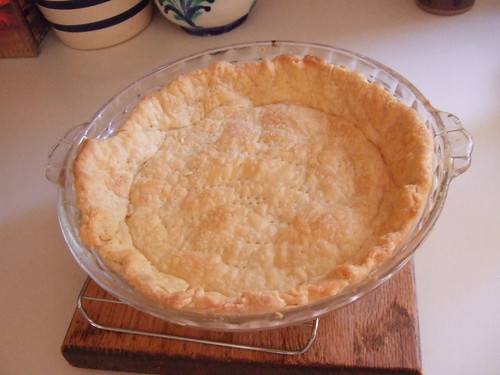
"I guess the main thing I want to say is what a pleasure it's been to share this tradition with you for lo these many years. And as for writing metaphors . . . something I noticed this year . . . there's a point in the process when (regardless of past success) I'm filled with doubts. It's that step when you put the berries in a pot with the sugar and corn starch and lemon juice. You turn on the heat, and the instructions say to cook until the liquid thickens and the berries soften. But it just looks so . . . dry . . . for a few minutes there. It is dry. It's impossible to imagine that it's going to turn into something juicy. And I kind of push the mess around with my wooden spoon wondering. Until, without fail, the magic occurs. A complete transformation into something deep and blue and beautiful and bubbling. I have my crust anxieties, too, of course. Whether it will hold together and so forth. But that dry mix in the pot. I'm telling you."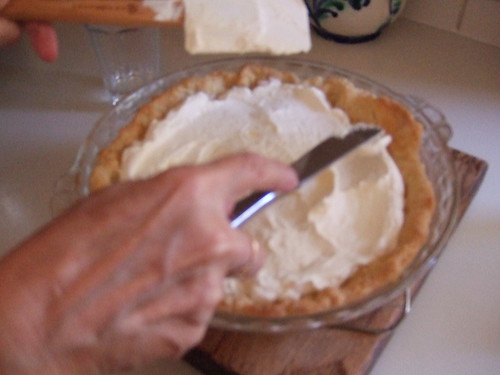
(I agree that it's a great metaphor for writing, but I've got to add it's helped me a lot in dealing with my illness.)
If you're a writer, you have to know how difficult it is for two novelists to dream and sweat and polish their novels into creation, and then to achieve publication. But that's what happened to Susan and me. Was it the pie that created the magic? I don't know, but I'm not taking any chances. Every August, for as long as I'm able (and sometimes, like this year when I'm not quite) I'm going to be buying organic blueberries; I'm going to be standing or sitting at the stove; and I'm going to be begging the muse for a story that will change hearts, and leave readers craving more.
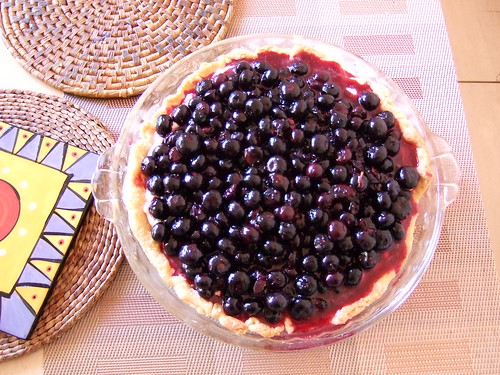
Wednesday, August 20, 2008
POLLYANNA LOSES THE GLAD GAME--well, almost....
You probably know why some of my friends call me Pollyanna--and not always in admiration. I understand; I really do. Sometimes optimism can be grating. When you're in the middle of a divorce or a twenty-four hour flu, you don't need your friend to tell you to take two ounces of bliss and call her in the morning. Or that even even the most dire circumstances might contain a secret gift. Sometimes, you just need someone to give you a huge hug and say, "You're right. This sucks."
Two days post-surgical and stilll unable to get my pain under control
(I still think that my pump apparatus wasn't working though no one believed me) I learned something revelatory about the human condition: suffering isn't fun. I also learned something about myself: I'm not very good at it. I'm not good at being lying in a bed in an uncomfortable positiion, unable to sleep or eat or enjoy the presence of my family because pain owns me.
I didn't want flowers. I didn't want to talk to anyone. It was a beautiful day outside. Really? Close the curtains, please.
I counteracted it with prayer, meditation, two ounces of bliss, but I gotta tell you, physical suffering is a pretty daunting opponent. If I looked in the mirror and saw my old Pollyanna self, I would have pitied her. Poor naive fool; she just didn't know...
Then, determined to exacerbate my misery, my nurse announced I had to walk to the solarium at the end of the hall. I steadied myself on my IV pole, and went, trying to smile at my nurse, but inwardly I was walking to the "this sucks" beat. Cha-cha-cha.
I thought about my old friend, Marie, who while suffering from stomach cancer, a broken hip, and a stroke, gave me her usual luminous smile and promised it wasn't so bad. She lied, I thought.
"I'll leave you here for a while to enjoy the view," the nurse said, settling me in what looked like a giant highchair. (The indignities never end.)
Of course, I wasn't happy with that either. I wanted to get back to my personal torture wrack where I could moan and twist with abandon. But being the people pleaser to the end, I agreed.
The view from the solarium was indeed a lovely portrait of Boston on a late summer day. It looked directly on Simmons College, where they were working on the soccer fields to get them ready for the fall. There was a cosp of trees in the background, and that intangible excitement of people walking through the city, students heading for the hospital to study medicine, skateboarders flipping dangerously between sidewalk and street, business people walking with the high purpose of Napoleon.
I wasn't a bit interested. I felt bad, lousy, miserable...well, you get the idea.
A woman sitting in a similar highchair greeted me. "How you doin?"
she asked.
"Good!" chirped the automatic Pollyanna. (Well, nobody wants to hear the bad, lousy,miserable line anyway...) Especially not one who could have surely spouted her own litany.
Then we started to talk.
She'd had some extensive surgery the same day I did, came from one of the city's poorer neighborhood, and appeared to be quite alone. But she radiated the kind of happiness Pollyanna would have recognized.
When she heard I came from the Cape, she glowed. "I go down there a few times every summer," she said. And she soon proved that she had the seaside in her veins in a way that I, a local resident never did. She didn't visit the Cape for the usual tourist outing. She came to do some serious fishing.
"I'm like a squirrel storing my nuts up for winter." She listed all the fish she caught; striped bass, scup, and a bunch I'd never heard of, though they were all pulled from my friendly neighborhood ocean.
Hmm. I could actually smell the air by the harbor. "But what do you do with them when you catch them? How do you get them home and turn those giant fish with eyes and heads into something that looks like food on a plate?"
"Well, I got myself a big cooler," she said, probably thinking I was an idiot. "And I clean them right out on my porch. When my neighbors who pass by, they all stop and ask when I'm gonna cook them up. 'You'll know,' I tell them, 'you'll know.'
And they do, too. Soon as I start cooking that fish, people are knocking on the door."
"I should try that," I thought already imagining another adventure for the consultants, their grandfather and myself. Maybe the whole family would go, and we'd eat fish all winter...Maybe we, too, would learn to store up our nuts!
"Fishing on Cape Cod, huh? That sounds like fun," I said, as if it were new to me, and in a way it was. I'd gotten so used to driving past the fishing boats as if they were furniture, I never actually thought about boarding them. But now, seventy miles away, I SAW them.
"Maybe I should try that."
"You should," she said, nodding her head. "But don't wait; life is short. You and I know that." It was her first reference to our common trials. She paused and looked out the window.
"You've got to appreciate the good days," I agreed, looking out at the people on the sidewalk.
"That's for sure," my new friend said. "But I'm grateful for days like this, too." She laughed. "We're here, right? And look at how green those trees are."
Everyone seemed determined to make me see those damn trees. By then, however, I WAS seeing them. And I was thinking about fishing next summer, and eating in the greasy, fish fry places near the harbor that I usually avoided, and sitting on my deck and cleaning fish...well, okay, I probably won't go that far. How about, sitting on my deck, drinking Chianti, and watching Ted clean the fish?
And once again, I was back in the game again. Glad, glad, glad.
P.S. Much gratitude and love to all of you: Even when I didn't feel like doing anything, I still loved it when Ted read the blog responses out loud, and I imagined each of your faces. (I know I haven't seen a lot of you yet, but you still have faces for me.)
And thanks, too, to those who never leave comments, but who have followed along and contacted me in other ways. (Theresa G: If you're reading this, please know your beautiful, courageous letter left a particular mark.)
Thursday, August 14, 2008
RED SHOES...and other news
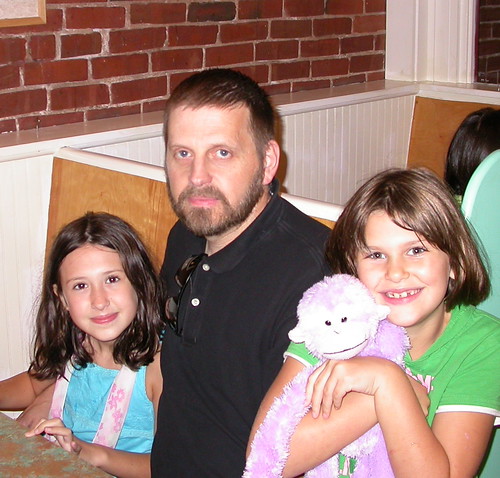
The Fashionistas with their grandfather
I'm not much of a footwear person, but about a month ago, I got an irresistible urge for a new pair of shoes. Not just any shoes either. I wanted some tall razzle dazzle hot heels. After a lifetime of flat shoes, I was done with the laid back life. I wanted the kind of shoes that would inspire me to walk somewhere I've never been before. But since I don't shop much, I called my two favorite fashion consultants (aka granddaughters). They were all over this mission.
Together, the three of us clunked and strutted around every shoe department in town, doing our best not to sprain an ankle as we feigned sophistication. I felt like we were walking through the eras as we tried on slingbacks and platforms, skinny pointed stilettos and sexy oxfords like my grandmother wore, but with five inch killer heels. I couln't help admire the consultants' aplomb as they crossed their legs and requested another pair of shoes from an annoyed sales clerk
"Yes, I realize those shoes aren't for children," the oldest and official spokesgirl said, "But could you please bring out two pairs in the smallest size." (I'm telling you, if I only had half this girl's poise and confidence...)
When the clerks glared at me, I just threw up my hands, and winced apologetically."Do you think they could just try a couple more pairs?" With my own children, I never would have allowed such shenanigans, but with the consultants, I'm putty.
And then I found them. They were wine red. Open toed. Retro. And oh so high. After I buckled them, I stood up, put my hands on my hips and looked my 6'1" tall husband square in the eyes. "How do you like me now, baby?"
The consultants gasped in unison. "Those are the ones!"
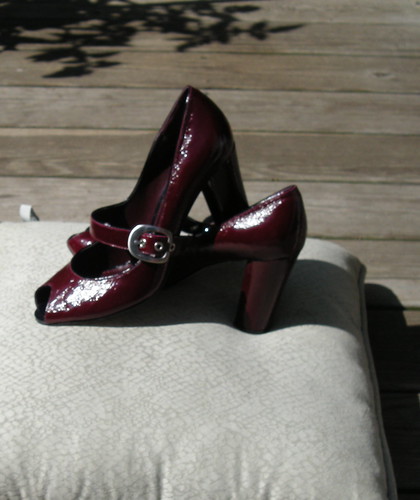
"The Ones"
So where have I gone in my wine red, mile high hot shoes? Well, nowhere. Instead, I've spent most of my time barefoot and on the couch. It's a life that would drive any normal person mad, but is usually quite fine with me. It's a comfortable couch for one thing, with lots of bright light, my animals around me, and a lovely family coming and going.
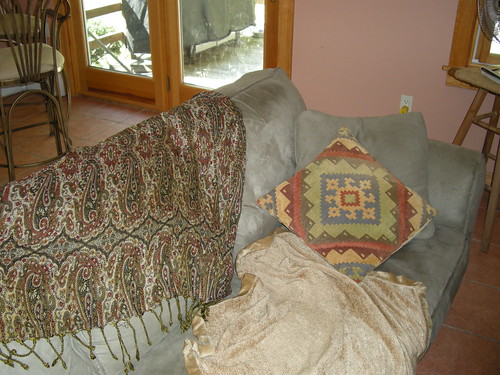
My magic carpet
But mainly my enforced exile from life has been fine because I've been working on a new novel. And while I've been sitting on the couch, my characters have been doing things like falling in love and traveling to Portugal and performing surgery, not to mention dealing with unbelievable treachery. And I've been doing it with them. How could I ever be bored?
But sometimes when I'm tired or not feeling well, I go to the closet and take out my glamourous shoes. And I think that anyone who owns a pair of shoes like that must have some fabulous destinations in her future. I imagine how the consultants will smile when they see me wearing them. Then they'll claim credit for making the woman I've become. And of course, they (along with the rest of my family) will be right.
***************************************************************************************************************************
IN OTHER NEWS:
* I haven't forgotten blueberry season. My friend Susan Messer and I have both baked our Literary Blues Pies, as has Diana Guerero and the Fawnskin Writers. I'll be posting on that soon, as well as on Susan's marvelous news. (Hint: the muse clearly rewards those who honor her with perfect blue pies.)

*And speaking of writers with brilliant muses, two people who I'm privileged to call friends saw new novels published this week. Tish Cohen's INSIDE OUT GIRL and Amy McKinnon's debut, TETHERED were both released on the twelfth. Though they are very different kinds of stories, they are both gorgeously written, and in their own ways, they both speak to the ultimate goodness of the human spirit. (Yes, I know that TETHERED deals with child murder, but trust me, this is a beautiful book.) (As for INISIDE OUT GIRL, you can check out my review on Amazon. I will say more later when I have the time and concentration to do them justice. But don't wait for me. Both these novels are undoubtedly right up front in your local book store. Check them out!
*As for me, I'm scheduled for another major surgery in the morning. So what am I doing up at nearly midnight blogging about shoes when I have to leave my house at 4:30 a.m.? Um, good question, but I never claimed to be logical. I guess I will try to get some sleep now, and the next time you hear from me, I'll probably be blogging about my hospital roommates.
P.S. Thanks to all who have continued to check in on me over the last two quiet months. I may not have written much, but you've all been in my heart.
Monday, June 02, 2008
HOW DO YOU STAND HER?
Here's one my mother began to tell in recent years: I was four or five, and sick with the flu so she stayed home from work. An extra day off was rare for her and she planned to take advantage of it by getting some things done. There was also a carpenter working on the house that day. But as they attempted to go about their productive business, I moaned theatrically from my room. Moaned and called for my mother every five minutes.
"Mama, take my temperature."
"Mama, bring me a glass of water."
"Mama, come and sit with me."
"Maaamaa!"
Finally, the carpenter packed up his tools in frustration, and said, "I can't work in this house." (If you ask me, he sounds like a constipated primadonna. But of course, when this story is told, no one asks me.)
My mother was immediately embarrassed for her house. It was old, a fixer-upper they'd bought for five thousand dollars in the fifties. Was he saying it was too far gone?
But when she asked what was wrong, the haughty carpenter only snorted. "It's not your house, lady. It's your kid. How do you stand her?"
So no, this is not my favorite story. And what makes me even less fond of it is my family's reaction to it. They never seem to get tired of hearing it; and no matter how time my mother retells it, they hoot at the punchline as if it were the first.
"But Ma, you always said how good I was," I say petulantly, hoping for some kind of retraction. "I was your little angel, remember?"
"Of course, you were good, honey," my mother says, patting my hand. But there is something in her eyes...(In the background, the hooting goes on.)
"The poor kid was sick!" I say irritably. "Was it too much for her to ask for a damn glass of water?"
But once again, no one seems to hear me. They're too busy laughing.
Anyway, I've come a long way from that whiney five-year-old. Or so I thought until this weekend. I'd had a low grade fever and hadn't been feeling too well all week, but on Saturday morning, things took a dramatic downturn. I woke up with the highest temperature I've ever had, heart racing, and a debilitating pain in my side. When I tried to get out of bed, dizziness knocked me back down.
It turned out to be a kidney infection, which is not usually greeted as good news, but my doctor was jubilant. The alternative, "what they were afraid of," would have required an ambulance trip to Boston, and probably a "procedure." An innocuous enough word, I suppose, but these days it's become one of the most dreaded ones in my lexicon.
So the good news was that I didn't have to be admitted. I could go home and rest on my own couch, drink tea (or in this case, cranberry juice) from my own blue cup, sleep in my own bed. The bad news was that I still felt like hell.
I settled myself on the couch, but the pain made it difficult to get comfortable; and my feverish head was too addled to read.
"Ted," I called. "Maybe you should take my temperature."
"Ted, I need a glass of water."
"Ted, come and sit with me; I'm lonely."
Ted, of course, had things to do, and he'd just spent five hours in the emergency room. "I can't just sit with you all day," he tried to explain. And I understood. Well, sort of...
Later in the evening, he was tired when he joined me so he tuned into a podcast on his IPod.
"Aren't you going to talk to me?" I said.
"Huh?" he said.
Then, reading my face, he took out his headphones and tried. The conversation wasn't exactly flowing though. See whining is essentially a monologue. The whiner has all the good lines: I'm hot; I'm cold; my stomach is killing me; my head hurts; you know, I just feel awful; in fact I feel like I'm gonna die right here...But the only line the other person gets is a variation on "Gee, I'm sorry."
When I realized I was getting nowhere, I escaped to the bathroom--internationally known as the best place to throw oneself a pity party. I tried my best to work up a good one.
Why has all this happened to me? I asked. Why do I keep getting sick? And how much can I take?
The only problem was it didn't work. I hadn't really felt sorry for myself since I got my diagnosis in October, and now when I was ready for a good wallow, I just couldn't do it. I looked in the mirror and answered my own question:
Why has all this happened to me? It just did. Deal with it, chump.
Why has my health become such a soap opera with constant histrionics? Think of all the years of good health you had. Were you asking why then? And if not, how dare you start questioning it now?
How much can I take? As much as I have to--and not because I'm particularly strong or brave, but just because there are no alternatives--except suicide and giving in to a case of terminal whining. I wasn't ready for the former; and the latter wasn't working too well for me.
And if my pity party wasn't enough of a bust, by the time I should have been shedding some pretty good crocodile tears, I burst out laughing.
Why?
Because at that moment, I remembered my mother's story. And maybe I remembered being that five-year-old with the flu, too. She was miserable and feverish, and even though her mother appeared every time she cried for attention, it didn't help; she still felt lousy. She was too young to know that even the most loving mother or husband, child or friend, cannot protect us from the pain and loneliness that is part of our life on this planet. And if we think they can, or demand they try, we only push them away--as I proved with the carpenter those many years ago.
************************************************************************************
I don't talk about books and writing all that much here, even though they're my life, but after this story, I figured you could use some good news that's better than a kidney infection:
The Liar's Diary sold in the UK last week, to a very enthusiastic publisher who plan to make it their lead title in spring, 2009, and reissue it in mass market paperback the following year. They say they're committed to doing everything they can to bring me a "huge" readership in the UK. Is life good or what?
Saturday, May 24, 2008
TEN YEARS AGO
Writer Lisa Alber recently tagged me for a meme. The rules and questions are posted on Lisa's blog, so if anyone would like to pick up the baton, please do! In any case, her answers were fun to read.
But since my life is largely internal, and anyone who visits here often probably knows too much about me already, I chose one question that felt significant:
What were you doing ten years ago?
Ten years ago, I was in love with my husband.
I still am. But now I know more about what that means, what it demands, and above all what it gives. I understand how love holds you up when you are weak, propels you forward when you don't think you can take another step, bears the unbearable.
Ten years ago two of my chidren were young enough to sink onto my lap when they needed comfort, young enough to be oblivious to my flaws, but my two oldest sons had already left the house. They were avid athletes and the rhythmic pounding of basketballs on the next street haunted me. It was the sound I'd always listened for when I wanted to call them home, but it didn't work any more. Why didn't anyone warn me this could happen?
Now I know that kids never leave home, not entirely. Now I smile when I hear basketballs on the street, or see bikes whizzing by in the spring, or walk through a street game of soccer or softball or hockey. Now they don't remind me of loss; they bring back my blessings.
Ten years ago I was a banquet waitress. Sometimes in the "season" I went to work at work at five a.m. to set up for breakfast, and didn't leave until the cocktail party ended at one the following morning. I remember being so tired that between functions, my friend Gina and I used to go outside and fall asleep on the grass or in our cars. I remember being shocked by the cruelty of the alarm clock that woke me after only four hours of sleep and demanded I do it over again. I remember feeling certain that I couldn't. Absolutely could not. But once I was in the car, driving through a clean new morning, my spirit leaped to life. And when I left the hotel late that night, the stars were never brighter.
Ten years ago, my co-workers and I worried and argued and gossiped about who got the best shifts, who claimed more than her share of power in our largely powerless world, who slacked off, and let others carry her weight. Since then, a couple of my co-workers have died; others have moved away; and many remain enduring friends. Now I wonder what we were arguing about, and why we ever thought those things were so important.
Ten years ago, waking or sleeping, I dreamed of the stories I would write, the novels and poems and plays I would produce. I searched frantically for time and space, for discipline and quiet to write them down. Sometimes I found it.
Now I 've written a book, but I'm still haunted by stories and visions and dreams, still search for uncluttered time to write them down. But now, every day, (well, almost) no matter what else is happening, I make sure I find it.
Ten years ago, I was a vegetarian; I worked out every day. I ran instead of walked, danced whenever I could, hoisted trays stacked high with ten dinners, and amazed my fellow gym rats by the number of heavy squats I could do. I never imagined a time when I would spend whole days on the couch or count pain pills, afraid I might run out.
Now I know that the only thing that's promised us is the chance to choose our attitude about what comes.
Ten years ago, my father sometimes stopped by unexpectedly. Though he'd retired a few years earlier, he still wore his work clothes--the shirt with his name stitched on the pocket, the navy blue pants, his cap. The hands that were always fixing things seemed uncomfortably idle. I listened as he retold the old stories, but he could tell I was "busy" and impatient to get back to my computer. He always apologized for bothering me when he left.
Now when I visit his grave on Memorial Day, I will think about what a miracle those afternoons were; and I will promise him and myself I will be different. I will take the time for everyone around me. I will understand that those who feel like permanent fixtures in our lives are already vanishing, as are we. I will be more patient, more willing to listen, to understand, to give the benefit of the doubt. I will think about a quote my grandfather taped to his mirror that went something like this:
"Any good that I can do, or any kindness I can show, let me do it now because I will not pass this way again."
Ten years ago, I thought I owned the future, but now I know the only thing that's ever belonged to me is today. Somehow it seems like enough.
.
Sunday, May 04, 2008
UNREASONABLE HAPPINESS: The Existential Question of the Week
The other night around one a.m., I was lying in bed reading, as I usually am at that hour, when I felt so overwhelmed by happiness that I had to put my book aside. I could no longer concentrate on the words. I wanted to go outside and run down the street with my arms wide open. I wanted to lift my creaky voice and sing an aria. But since my health wouldn't allow for the former, and my sleeping family didn't deserve the latter, I just sat in bed and smiled.
Exultant was the word that came to mine. "Perfect joy" was how Ted described it when the energy I was giving off woke him up--in spite of my best intentions. And yes, it was that--indescribably perfect joy--for absolutely no reason. Happiness as free gift. No one had called me at one a.m. to tell me I'd won the lottery, or hit the bestsellers list; I hadn't recently fallen in love. Or maybe I had--though not in the way the term is usually used. Maybe I'd left the shallow, mundane world I usually occupy and fallen through a trap door to the place where being in love is quite simply our natural state.
So what triggered this crazy intemperate fit of happiness? It seemed to be a confluence of circumstances: the peace of the house late at night, the cool wind that was blowing through the window, and the presence of Ted beside me. But most of all it was a passage in the book I'd been reading-- a yet to be pubished novel called THE GARGOYLE by Andrew Davidson which the publisher sent me for review. In that passage, a young debut author had managed to accomplish the highest thing a writer can hope to do, at least for this reader: open the trap door, and reveal the goodness and the love we are meant for.

The next day I went back and re-read the passage, wondering why it affected me as it did, but I couldn't recreate the way I felt the night before. I couldn't feel the cool, dark wind that came through my window, couldn't see the way my reading light illuminated my messy, imperfect bed, or my equally messy, imperfect life. I could remember it and I could smile about it, but I couldn't have it back--not exactly. I guess that's the way it is with free gifts. Still, I'd be lying if I said I wasn't a little disappointed.
In my late night hour of perfect joy, I thought that this time I might remain exultant forever. This time I "had it." But the next day, the trap door quickly shut behind me. I allowed myself to be offended when a friend commented rather unkindly on my weight loss; and I repeated my petty complaint to everyone I encountered--spreading the negativity. "How insensitive can she be?" I raged. "Would you say that to your worst enemy?" I ranted. But as usual, nourishing my outrage only left me feeling drained and sick of myself. Eventually, I realized all I had to do was shut-up and let it go, and poof! It was over.
So no, I don't yet "have it." I haven't trapped bliss under a hat or captured it in a jar. I haven't moved permanently into the country behind the secret door. But for some reason, I seem to visit with increasing frequency. For some reason, I find myself startled, accosted, flooded by happiness in the damnedest places, at the most unpredictable times more and more often. It comes in hospital beds, and in the bed where I've slept for more than twenty years; it's there when I'm tired and on the wonderful days when I feel a surge of my old energy. I don't know where it comes from, but I can only hold out my humble cup, and say, "yes, please" when it arrives, and "thank you" when it passes by.
So here it is--the existential question of the week (remember those?): When was the last time you felt incredibly happy for no particular reason?

*And speaking of perfect joy, all photos were taken at my grandson Hank's first birthday party.
Sunday, April 20, 2008
FLOWERS THAT LAST
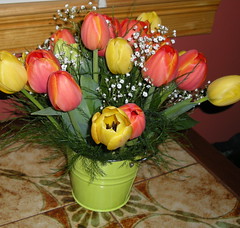
I started this post twelve days ago, but I was too tired to finish it. In fact, "too tired" has pretty much defined my life for the past two weeks. Too tired to fix my own tea, or to answer a comment on the blog, or to talk longer than three minutes on the phone. A flight of stairs was a mountain; and a shower a days work. I listened; I read; I enjoyed and appreciated, but I had nothing to give back. It was as if the effects of five major surgeries in three months descended all at once. My blood pressure plummeted. Blood tests and my ghostly pallor confirmed I was anemic and dehydrated.
The past two days have been a bit better. I walked a half block--today one house further than I did yesterday. I didn't realize how slow I was until I noticed that that my lame twelve-year old dog was yards ahead of me. But I'm not complaining. I was all dressed up in a pair of old gym pants, and I was outside.
When I passed the grumpy neighbor who never responds to my greetings, I felt a tinge of old resentment. No matter what, I wasn't saying hello to that guy again! I stared straight ahead, determined to ignore him. But he was working so close to the street, I couldn't quite pull it off. I called out a listless, head-down, "How you doin?" Then I kept going, prepared for another snub. But to my surprise, my taciturn neighbor looked up, put down his spade, and asked me where I'd been. Excuse me?
"I haven't seen you in months," he said. I didn't know he'd ever seen me AT ALL, but I didn't say so. Instead, I complimented him on his neat flower beds. He leaned on his fence and told me about the trouble he's been having with his underground sprinkler system. I'm not much interested in sprinkler systems, nor do I understand their workings, but it felt good to be talking to another human, and even better to realize my resentment had been unfounded. People are always more complex than we think. Damn. Shouldn't I know that by now?
But this post, the one I began a couple of weeks ago, wasn't supposed to be about my health problems, or my snail walk around half a block, or my neighbor's sprinkler system. It was supposed to be about flowers! Yellow and orange tulips to be specific.
Wilma, a student in the nurse practitioner program delivered them in their citron yellow bucket a few hours before I left the hospital. Wilma wasn't one of the wonderful nurses who'd been responsible for my direct care, but she'd come in to take my blood pressure a couple of times and I'd met her in the hallway during my daily walks. I liked her gentle manner, and the soft whispery voice that seemed to draw her listener closer.
During the three weeks I'd spent on her floor, Wilma and I had talked a few times. I learned she was the single mother of two adolescents, that she often worried about the neighborhood where her boys were growing up, and the many hours they spent alone while she worked and studied. These were concerns I understood well.
After I admired the gorgeous flowers Wilma had placed in my window, I wondered out loud who had sent them. "There doesn't seem to be a card..."
Wilma smiled shyly. "They're from me," she said. "I know you've been through a lot and I just wanted to give you a goodbye gift."
I was stunned. I knew how exhorbitant the prices in the gift shop were, and I also knew enough about Wilma's life to guess they weren't in her budget. Undoubtedly, I embarrassed her with my hugs, and my insistence that everyone on the floor come in to admire my tulips--and the extraordinary kindness they represented.
The flowers only lasted a few days, but Wilma's gift is still with me. So often we tell stories about other people's mistakes and failings. "I never would have done that..." we say, attempting to prove to our ego and our listeners that we are better, stronger, more compassionate. But in the end, those judgmental stories we love to tell (the kind I once told about my unfriendly neighbor!) only prove the opposite.
I might not ignore a neighbor on the street, but I wouldn't have done what Wilma did either--at least, not in the past. If the idea of buying flowers for a passing acquaintance arose, I would have quickly quashed it. I'd fall back on the beliefs that govern my life more than they should, beliefs like "You can't afford that!" or "Gift shop flowers are only for close friends and family." Well, who says?
I hope Wilma's radical generosity taught me another way. I hope it reminded me that life is too short NOT to give more than we think we have, too short to miss out on the joy of bringing tulips to strangers.
Monday, March 31, 2008
MY TRIP AROUND THE WORLD
It wasn't a trip I wanted to take; there were no beaches or cocktail hours; and the only souvenirs I brought home are carved into my abdomen. And yet, I traveled far, saw things I'd never seen before. I learned more about the internal and external world than I have on any other trip I've ever taken. My love for friends and family has deepened and changed.
If I could go back and refuse the journey, I'm not entirely sure that I would. I'm not the same person I was when I entered the hospital for the first time on November 28th, and I don't think I will be her again. Her preoccupations are not mine. Her sense of time and priorities are different, too.
If you asked her why she wanted to live, her answers would have been theoretical, and would not always have been borne out by the way she spent her time, or the words that flowed from her mouth all too easily.
There's nothing theoretical about my reason for living now. I think before I speak or act now. Do those words, that way of thinking represent who I want to become? Is a given activity really worth doing or am I doing it because it feeds my ego or alleviates my fears?
In the past four months, I've spent a total of five weeks in the hospital. I shared both a room and many intense hours with unknown roommates from the U.S., China, Equador, Monseurrat, Cambodia, and Panama. I found some more congenial than others, but I learned from all of them.
If I had a choice, I would have opted for a private room, but these "strangers," each enduring their own hour of crisis, blessed me with their lives, their stories, their friendship--and above all their courage. They proved again and again that what we think we want--solitude and a chance to control our environment, is good; but rising out of ourselves and the narrowness of our lives is better.
"My" hospital was a teaching hospital, and I came to love the atmosphere of wild learning that pervaded the place. As one resident told me, everyone there was mentoring someone else. It was an atmosphere where no one knew so much that they couldn't learn from someone else; and no one knew so little that they didn't have something to teach.
That's the kind of world where I want to live; it's also the place within myself where I returned to at the end of my trip. If I have something to give, I want to give it--and without reservation. At the same time, I want to keep my eyes, my ears and my heart open to all that I clearly have to learn from the mentors who startle me at every turn.
Saturday, March 29, 2008
ONE MORE SONG
Last night, I couldn't sleep. Maybe I'd been spoiled by three nights in my own bed. Or maybe as Lisa Kenney once wrote to me, night is just a particularly vulnerable time for people in the hospital.
Around eleven, my roommate, a young woman from Panama, got a call. It seemed her three year old son was having trouble sleeping, too. He needed his mother to sing to him to sleep, just like she always did.
And so she did. It turned out to be a long concert, as the boy continued to beg for one more song, not wanting to let go of the connection to his mother's voice.
I'm not sure how long it took for him to fall asleep, but I slipped off to the sound of her voice after about the third song.
Today, as I was watching the "Power of Song" a documentary about Pete Seeger on PBS, I smiled as I remembered the night before.
At the end of the documentary, Pete said we don't sing enough any more and it's a huge loss. People used to sing when they walked and when they built roads and bridges and when they cleaned their houses; and subtly they lifted up the world around them with their song--or comforted it, as a sick woman, singing to her child stilled and illuminated my hospital room last night.
I've never had a voice as strong as the man I heard singing "Good Morning Heartache" last week, or as light and high as my roommate's, and I can't play the banjo like Pete Seeger. But I can tell you one thing; I will leave this hospital (hopefully
tomorrow) determined to sing my song and to sing it with all the force I have in me.
Tuesday, March 25, 2008
CALL MY BOYFRIEND
During my twelve days in the hospital, I outlasted five roommates. The last one had attempted suicide in a particularly violent manner, and ended up with abdominal surgery.
Through the curtains, I heard the doctors say it was a miracle she'd missed any major organs. It was a miracle she was alive.
Through the curtains, I heard her awaken, surprisingly greedy for life. She wanted a turkey sandwich. She wanted the 18 karat gold chain that had been taken from her neck in the ER. She wanted the clothes that had been cut from her body. Maybe they could be repaired.
But most of all she wanted her boyfriend. It was a fairly complicated process, but the nurse dialed the long distance number she provided. No answer. They tried the woman's sister, her "best friend," but there were no answers at those numbers either.
The woman slept fitfully, guarded by a paid suicide watch, but she opened her eyes every hour, always with the same words: Call my boyfriend. Please! I need someone to call my boyfriend.
The paid watcher was a young nursing student who busied herself with homework. The only time she spoke to the woman in the bed was to report that there had been no answer. Again. Not from her boyfriend, or her sister either. The friend had apparently taken the phone off the hook.
Had anyone called the hospital to see if she was all right? the patient wanted to know.
No one, the nursing student said and went back to her homework, looking slightly troubled. When her shift was over, she was replaced by a middle-aged woman who liked to watch cartoons--at a loud voiume.
Call my boyfriend, the patient said to her middle-aged watcher--as if it was a new request.
By the time the fourth shift arrived (another college student) I knew that the the boyfriend would never take her calls. Nor would her sister. I also knew she would keep trying.
When the nurses came in, the watcher told them that he wouldn't take these shifts again. They were too boring.
Slowly the patient and I began to talk. She told a story about children born and vaguely "lost"--like a misplaced passport or a wallet. About a life that began in a distant country and had wended its way through many exotic locales, leaving little but chaos and loss in its wake. About the boyfriend who drank too much and couldn't work because he was haunted by the ghost of his dead mother.
Her suicide attempt was "a stupid mistake," she said. But it was "over" now. Besides, she needed to get home. If she didn't get to work on Monday, she might lose her job.
The watcher, who was being paid to care about her life continued to underline his text book in yellow marker. I wondered if he was listening, and what he thought about this turbulent life so different from his own. I wondered what I thought. It was a story I couldn't completely understand, and certainly could not judge.
How had she ended up so alone? Why didn't one person care if she was alive or dead? But one thing I understood was her desperate need for connection.
Do you have a cell phone? she asked me. Because you know, I really need to call my boyfriend.
I knew that once I gave her the phone, she'd use it incessantly. And of course, I also knew her quest was futile, but I tossed her the phone anyway. As she clutched it to her ear, I felt the endless ringing in my brain, in the pit of my stomach, in my heart.
No, her boyfriend said to her. No, her family.
She left at the same time I did. Left in an oversized sweat suit that had been given to her by the hospital and a pair of padded socks on her feet. Left in a cab she couldn't pay for that would take her to the place where the phone had continued to ring in emptiness. Despite her violent effort to hurt herself, she seemed remarkably resilient--both to the psychiatrist who released her back to her old life and to me.
People have told me I've been courageous in dealing with my ordeal, but I haven't been. Not particularly. All of you would do the same. You would hear the most challenging news, as some of my roommates did, and then an hour later, you would be on the phone finding a way to explain it to your family and to yourself, looking for the bliss. You WOULD.
But I wonder if I would have the kind of courage my abandoned roommate had. I wondered if I would comb my hair, and put on my make-up, wanting to be attractive even in the sweatsuit that didn't fit, in an impervious world. I wonder if I would have waved as cheerily as she did when she left.
Good luck to ya, I told her. It was what my grandfather used to say in place of goodbye; and he always managed to imbue the words with such deep sincerity it makes me cry to think on it now. I tried to do the same.
You, she said, almost like an accusation. You already have good luck. After two surgeries in a week--the last one tenuous at best-- and twelve days in the hospital, I wasn't feeling particularly fortunate at that moment. My smile was probably pretty weak.
She glanced at Ted before looking back at me pointedly. Your kids come to see you and your boyfriend is here night and day. You think there's better luck in the world than that?
No, I suppose there's not. How could I have forgotten?
Saturday, March 22, 2008
WRITER IN RESIDENCE
This morning, after ten days in the hospital, my nurse told me I had become the official mayor of the floor. But if f they're going to hang a sign outside my room, I would prefer it say "Writer in Residence." . I never was much for politics. As a writer, I tend to grow empathy for even the darkest of characters. Clearly, I'm unfit to govern--even among my own creations.
So. After days of sipping clear liquids, watching TV, surfing the net, reading books and emails ( which I can't answer from the hospital for some reason) a strange urge came over me. It was the urge that has dominated my life. Stories bubbled up; a poem began to form. I thought of the novel I would begin after the one I'm working on was finished, and behind that, I glimped the shadow of another.
How strange, how marvelous that it should follow me here! Even when my brain is still thick with anesthesia! Even when I ignored it in favor of TV and magazines! Still it follows. Still it comes.
As for my medical status, I'm well enough to walk to the kitchen and make tea, well enough to joke with the staff, and to get excited about the new "surgical soft" diet that's been ordered for lunch. (It's been a long ten days on jello and broth.) Now it's pretty much a waiting game. Waiting to learn if the surgery will hold. Waiting to eat normally again. Waiting, waiting to see the imperfect incredible place known as home.
Thanks to all who have continued to check in on me, who have left such wise, caring comments, who have kept up the "hope watch" with me. I send smiles and hugs to each of you.
Tuesday, March 18, 2008
GOOD MORNING HEARTACHE
Well, it's a good thing I didn't worry before my surgery. It's a good thing that I reveled in every moment of being at home, rather than spoiling it by mentally leaping into "what might happen." Because as it turns out what might happen arrived all on its own.
My recovery was on track until Sunday when I became serioiusly ill. Doctors were summoned (one even racing down the hallway), tests were taken, conferences were had. The consensus was even more desperate than the way I felt. My surgery had failed, and would need to be repeated (today at 1:30.)
Fortunately, by yesterday, I was feeling much better. A young Vietnamese man arrived to take me by wheelchair to radiology. It felt like a real outing. Running 3 and a half minutes late, and obsessively punctual, my high spirited driver gave me the kind of thrill ride I haven't had in years. We practically did wheelies around the corners.
Wheee!
Once I got off the ward, I marveled at the healthy people I saw, and all the incredible things they could do without a second thought. They walked fast, carrying backpacks or heavy satchels, while nattering on their cell phones about what they were doing that night.
A woman enjoyed a bagel and coffee at her desk. Then around the next turn, a frustrated young mother, chased a toddler, while balancing a baby on her hip. A man, talking in the hallway complained that his supervisor was compelled "to micro-manage everything."
In another time, I have done all these things, I have been all these people (though I don't think I've ever used the word micro-manage.")
(Remind me to try it.)
My popular driver was greeted enthusiastically by co-workers everywhere. "How ya doin?" they asked.
"Same old. Same old," he responded the first three times.
That was when I spoke up. "Look at you. You're racing. You're whistling. You're calling out to your friends. You're not Same Old anything. You're WONDERFUL."
He laughed out loud. When he met the next friend, he didn't even wait to be asked how he was.
"You know how I am today? I'm WONDERFUL."
My destination was a spot in an empty hallway where I was to wait for the radiologist. I was sitting there thinking of everything I'd seen on my ride when unexpectedly, someone behind me belted out the old Billie Holiday classic, Good Morning Heartache. It was a damn good rendition.
I turned around and saw an old man in a wheel chair, waiting as I was. He continued to sing, and when he was finished, I clapped.
"Do you know that song?" he asked.
Oh yes, I know that song. All too well.
But then I thought about all the people I'd seen that day. I thought about how blessed they were. All of them. And how blessed I was, too. Blessed to be loved by my family and friends, to be cared for by an amazing team of doctors and nurses. Blessed to meet my buoyant young wheel chair driver, and to be able to see the world around me as I traveled. And especially blessed by an old man, sitting alone in a hallway, who had the fortitude to turn his troubles into a song.
**********************************************************************
Thanks to all of you who have left such beautiful messages of support in this past week. Some days, though you may not have known it, you have held me up.
Tuesday, March 11, 2008
WORRY BEADS
Surgery is scheduled for tomorrow at 8 a.m. so the other night, lying in bed, I started to relive my recent experiences. It was easier not to contemplate what was about to happen to me before my first operation. These days I know too much.
My heart did a jumpy thing. Was it palpitations? A sign of undetected heart disease? Was I really fit for surgery? After all, I've done nothing but much but hang out on my couch the last couple of months--not very good training for another marathon in the OR.
Then I realized that I was worrying, and that worrying is optional. Phew! I turned out the light, put the worry beads under my pillow and slept like a child.
See you all in a few days.
Saturday, March 08, 2008
GABE'S HAIRCUT
When he was growing up, my son, Gabe, always requested the same dinner on his birthday: lasagna and mashed potatoes. These days we skip the mashed potatoes, but still honor the tradition.Forget the gifts; don't worry about the cake. The only thing Gabe really wants for his birthday is a meal worth remembering. An Italian meal.
And since he lives in Rhode Island, we have a lot of choices. If there's anywhere outside Bologna that has more or better Italian restaurants than they do in Rhode Island, I'd like to hear about it. This year, a small, unpretentious place in Smithfield served up the most awesome bruschetta with cannellini beans and eggplant rollatini I've ever had.
But the best part of the meal was fervent conversation we always have. We are the kind of family who talks so much, each excitedly waiting for a turn to speak, that when we finally look up, there's no one left in the restaurant but the employees. (As a waitress, I hated people like us, but we at least, we always tip well.)
Right now Gabe and Nicola are hard at work promoting their new business, RentProv. That means going out and getting to know the communities they want to serve. It means walking the streets of various towns and neighborhoods, talking to people about what they do, and what they hope to do. Or just talking to people, which has always been Gabe's favorite activity.
In the smallest state in the country, are still a lot ofof small family-run coffee shops and bakeries, sub shops and delis; and Gabe is determined to sample the food and meet the regulars in all of them. He's also learned that it's those small businesses, the heart of any community, who are willing to post his flyers, to take an interest in his dream, and offer to spread the word.
Last week he was walking through a somewhat downtrodden, but friendly neighborhood in Providence when he noticed a barber shop. The windows looked as if they hadn't been washed in a decade, and there were no lights on, but when Gabe tried the door, it was open.
The first thing he noticed in the empty shop was the overwhelming scent of urine. The second thing was the barber snoozing in chair, with a very large, tabby in his lap, one mistrustful eye open. Gabe estimated the barber's age at somewhere between eighty-five and ninety.
A lot of people would have slipped out before the man woke up, but Gabe decided on the spot that what he needed most in the world was a haircut from an octogenarian barber.
He had to poke the poor man three times before the barber leaped off the chair, blinking in bewilderment. "A haircut? What? Well, sure!"
So for six bucks, Gabe got himself a haircut that was reminiscent of the ones I used to give him when I bought my first set of crazy clippers, and an hour of talk about the history of the neighborhood where the barber had done business for over fifty years.
It's the kind of deal that is becoming all too rare.
Tuesday, February 12, 2008
ONE FOOT IN FRONT OF THE OTHER
It's as difficult to explain why one blogger speaks to us in a particular way as it is to describe the mystery of any friendship. Maybe I returned to certain sites because they were asking the same questions I was. Or maybe it was because their answers were better than mine. More beautiful. Truer. Deeper.
One such blogger was Michael who posted photographs and poetry at One Foot in Front of the Other. Michael had been living with a rare cancer for six years, and occasionally he mentioned the anxiety of an upcoming blood test,or another health issue, but that was never the focus of his blog. Mostly, he chronicled his love for all things Japanese, for New York City, and the chess players he photographed in Washington Square Park, for his work at a New Jersey newspaper.
He was frequently wise, and always honest.
Michael visited here, too, but the only time I heard from him directly was in early December after he'd learned of my illness. He offered encouragement and wished me well, but didn't mention his own deteriorating health.
Only after I visited his blog did I discover that that while he was sending me his good thoughts, Michael himself was dying.
In his last month, he wrote about his pain and his fears, about saying goodbye to friends and giving up his cats, but also about the simple joy of a cup of tea. And as always, he wrote about the kindness and the love--the great and incredible goodness he saw in the world around him. He cited his faults and claimed he didn't deserve it, but there it was--"sunrise on his wild path" as photographer Denis Collette aptly titled the photo above.
Michael's last entry was on January 3rd. It was a poem about looking in the mirror and encountering death. But it ended with a personal triumph, a sense of blessedness.
After that, I was almost afraid to return, and when I did, there were no new posts. The poem, I believed, was his final message to us.
I was wrong.
Yesterday I went back and found that his sister had posted two photographs of Michael. She'd also written eloquently about his final weeks, and his death on January 15th. How can I describe my sorrow for this stranger, this friend I never met? Late at night, I sat up in my room in the dark, and pondered it.
But Michael left more behind than sorrow. In a photograph taken after a religious ceremony that was held shortly before his death, he is wasted, but beautiful.
"This picture," he said, "shows all the good and all the evil I've ever done in my life."
They are interesting words from a man whose best photographs were always portraits.
People speak about cancer victims winning or losing their battles with the disease, but I don't see it that way. I think that all of us, both the healthy and the sick, do as the name of Michael's blog describes.
We put one foot in front of the other and keep going. We try to love the world as we find it; and in the end, when we encounter death in the mirror as Michael did, we hope the good overcomes the evil.
Look at one of the last pictures of him shown in the post called Daiku, and tell me you don't see compassion. Tell me you don't see peace.
Thursday, January 31, 2008
THANK YOU!
The day before my first surgery I took a walk on the beach where I found a red stone like the one in the photo, and knew I had to have it. Stones, shells, I'm always bringing something home--to the chagrin of my family--who often ask, "What's so special about THIS one?" and "Can't you leave a few on the beach?"
Of course, they're right. The house is cluttered enough with my natural collectibles. And as any child with a pail or adult with pocket can tell you, the wet stone glittering in the sun often turns into something quite ordinary when you try to bring it home.
Not all of them though. Some grow even more extraordinary the longer you look at them. "The Liar's Diary Blog Day" which was planned and organized by a few amazing writer friends--and participated in by literally hundreds of others--including some of my very first blog friends, and others, who had never heard of me, my book or my blog, but who jumped in and said "I want to help'" is like the latter. The longer I look on it and the more I think about it, the more it shines.
Among the wonderful souls were authors who are like gods to me, and those who never aspire to publish beyond their blogs, many people I've met, but far more who I will never know. There were also agents and editors and publishers who defied the cynics by proving it's not all about the bottom line. The real reason they got into this business is because they love books and people, and because they really believe in their heart of hearts that stories can change the world.
I spent the day wandering from blog to blog, but still haven't hit half of them. (I will though!) I cried a lot, but I smiled far more. I had been told not to attempt to comment, and for the most part I didn't. I let friends like the wonderful Robin Slick, who visited so many on my behalf, say my thank yous for me. Know that I realize it's a debt that I can't possibly repay--but hopefully, karma can.
I also know that this goes far beyond me and my illness, and the book you all promoted for me when I couldn't do it myself. Once again, it all goes back to defying the cynicsim that has become so much a part of our world. A cynicism I've frequently indulged in myself.
Others have said it better, but the very best part of blog day has been the amazing show of goodwill. It's out there. If it can send a just-released novel shooting up in the Amazon numbers, and can make writers and cancer survivors and bloggers everywhere feel just a little bit closer, a little bit more united than we were before, imagine what else it can do?
And so back to that red shiny rock I found on the beach the day before my surgery. I didn't know why I was picking it up and bringing it home, but now I do. It's for YOU. For all of you.

I'd be remiss if I didn't mention a few of the people who worked incredibly hard, and dreamed incredibly large to make this happen: Laura Benedict, who started all this with an idea and worked hard to carry it though, Susan Henderson of Litpark and Karen Dionne of Backspace both of whom have an amazing gift for bringing people together, and who frequently put their own work aside to promote others, Jessica Keener and Tish Cohen who shared their knowledge and ability to get the word out, also sacrificing hours of precious writerly time, my fabulous literary agent and even more fabulous friend, Alice Tasman, who cried with me when we first learned of this effort, and has done more behind the scenes to help than I'll ever know, Dan Conaway, who is NOT my agent, but still put valuable hours and enthusiasm and heart into getting this off the ground, all my good friends at Gather, Huntington Sharpe from Red Room, who designed a terrifc author page for me, and who mobilized the site to get dozen of authors involved, Sheila English and Victoria Fraasa at Circle of Seven Productions who made a Liar's Diary book trailer that made it to #7 on Google Videos last night, the delightful Eileen Hutton at Brilliance Audio who offered audio clips, MJ Rose who got out the troops at ITW, my fellow writers from Killer Year, several of whom were out promoting our anthology of the same name, but who took time to get involved in blog day, and two outstanding and generous bestselling authors, who took the time to read and support THE LIAR'S DIARY from the start. Both Jackie Mitchard and Tess Gerritsen once again, stepped up, and shared their thoughts on the novel. And I can't forget my wonderfully supportive editor, Julie Doughty at Dutton, my publicist, Laurie Connors, and all the people at Plume/Penguin, without whom there wouldn't be a book to promote.
A huge thank you--and much bliss to them--and to all of YOU--who made this day a small miracle.
Friday, January 25, 2008
RATE YOUR BLISS
I promise to stop wriitng about "my trip to the hospital" soon. Very soon! But apparently, I'm a classic case of a writer who doesn't get out much. It's not that I don't see lots of people every day. Family, friends, and friends of the kids flow in and out in a wonderful stream. They bless my life--all of them--even when I bellow, (most often internally) "Hey, I'm trying to get some work done here!"
But what I've missed from my waitressing days, and what the hospital provided was interaction with the wider world. People I didn't know. Stories I hadn't heard. Catalysts to insights and thoughts that stretched far beyond myself and my beloved few. The stream that becomes a vast, transformative river. In the hospital, I walked into that river again.
For my second surgery, I only had one request: I wanted to go back to the same floor, White 7, where I already knew the nurses and the aides, the dietary and housekeeping staff. I loved them all. But it was probably the intimacy of sharing a room with various strangers, all enduring their own crises, that affected me most.
I've written before about the Chinese roommate who had been hit by a car while crossing a street. I've written about how we banished our night terrors and pain by speaking them out loud in the dark. What I haven't written about is the other kind of pain we discussed late in the night. The pain of injustice and invisibility.
Though she had several broken bones, a badly shattered ankle and a dislocated shoulder, what seemed to bother my roommate most was that other kind of pain. After we'd gone through the list of our physical suffering, she would re-tell the story of the woman who'd hit her with a BMW. The woman whose only concern seemed to have been spinning the story to avoid responsibity...
"I was in the crosswalk, but she told the police I walked in front of her car..She never looked at me....I was lying in the street, my whole life changed, and she never even asked if I was all right..."
It seemed incredible to me that anyone could be so callous, so blind. But of course, every day in our world, people make decisions about who we will look at deeply and who we will refuse to see. Every day, we turn away and deny responsibility just like the woman in the BMW did.
"They won't believe her," I said in the dark.
But my roommate's experience caused her to doubt. "She was rich, and I'm an office worker...my English, it's not so good...maybe they believe me and maybe they don't."
As our week together went on, our families got to know each other, and a genuine bond formed. One of her nephews wanted to become a writer, but the family worried that it wasn't a practical choice. (I couldn't disagree, but I also couldn't help telling him to keep writing!) A niece was a talented artist. I admired the caring and closeness of her extended family, and envied the wonderfully fragrant home cooked dinners they brought to her every evening.
One of the more baffling (and entirely subjective) questions a hospital patient is asked regularly is to rate your pain from one to ten. In my reference point, ten was childbirth, and seven was a throbbing tooth in need of a root canal. I wondered where the pain of invisibility fell on the scale.
No one ever asked me to rate my bliss, but I did anyway. Bliss was the gorgeous, concerned faces of my roommate's nieces and nephews and my children as they entered our room in the evening, their coats glistening with snow, cheeks bright with the cold. Bliss was seeing and being seen by the people in front of us, and by each other.
Though we talked about our suffering in the night, during the day, we joked with the aides, and told stories about our very different childhoods. In a cramped hospital room, looking out on the snow, I traveled far. We sipped our tea together, and talked about how good, how very good, it tasted. My roommate had a wonderful, tinkling laugh, which I'd heard--amazingly--on the first night when they brought her in on a stretcher.
That laughter is still with me. On the bliss scale, it's a ten.
Monday, January 21, 2008
LONGEVITY, Part 1
I've never really had the urge to write a special post commemorating a federal holiday, but today (which by some mysterious process turned into yesterday about forty-five minutes ago) I did.
It's probably because recently I've been thinking a lot about Martin Luther King. In fact, I've thought about him so much I couldn't fit all the things I wanted to say about him into one post. I've thought about him in a personal way; and I've thought about him for the work that consumed his life. His life long war against invisibility--not for himself, because he was likely to be seen no matter what--but for others.
But as I just proved, a day can turn into a yesterday so quickly that you never get a chance to write the things you want to write, or say the things you intend to say--or damn, even do the laundry.
It was a good day though--so good that when I went to the pharmacy to pick up my prescriptions, I decided to saunter around the mall a little. I was just going to go to one store, but before I knew it, I had walked through the entire marketplace.
I bought myself some new underwear in rainbow colors, and a pair of fake Uggs for twenty-five dollars. I ran into some people I knew and stopped to talk.
They seemed surprised to see me out walking around, but they were too polite to say so, and I was too polite to tell them to stop looking at me like a ghost. After a while, we all forgot how wondrous it was to be alive and walking around the mall shopping for underwear on a federal holiday, and just talked.
Then, as I used to do when going to the mall was not a noteworthy accomplishment, I stopped at B & N for a mocha latte. I got tired before I finished it, but it still tasted good.
At the front of the store was a whole table of books about longevity. Foods to eat. Exercises to do. Thoughts to think. I used to love books like that, and I don't doubt they're full of marvelous advice. But today I walked past them, feeling kind of wistful for my old self. The self that believed those books could somehow save me.
The trouble is I ate the secret foods, did the work-outs, thought the thoughts, took the cleansing breaths, and I still got sick.
Maybe I put too much faith in those things before. Maybe I saw those books as talismans. Maybe I believed that if I just found the right one, I could live forever--or for a hundred years, which felt like forever when I first started reading about eating seeds and breathing deeply and living with gratitude.
Don't get me wrong; I'm still for healthy living and yoga and running for miles along the beach, and saying thank you whenever you get the chance. I just don't think of longevity as something I can buy at B & N anymore. Nor is it quite such a preoccupation.
Even though I have every longing--and these days, every hope--of writing more books and celebrating more anniversaries and seeing my grandchildren grow to be sturdy adults, I see things differently now.
Now, like MLK, I just want to do the work I have in me to do, and give whatever I have in me to give, however small and humble it might be.
More tomorrow...or is it today?
Tuesday, January 15, 2008
THE WRITER'S VIEW
For most of my life, my view as a writer was similar to the one from Hans Christian Anderson's window--not without its magic, but distinctly lacking in human warmth.
As a professional waitress and mom living in a small seaside town, I didn't know a single novelist or poet, published or un. I was strictly a closet writer No one but my family and a few close friends knew about my crazy dream to write a novel, and through some mysterious process that involved query letters and agents and secret meetings in New York, to actually get it published. I lived for the slow season when I could upplug the phone, shut the door to my room, and lose myself in my private passion: words and the world I created from them. If the winter months spent in that room were lonely, I accepted that as an occupational hazard.
That hasn't changed. As a full time writer (though I don't feel much like one lately) I still spend way too much time alone, fighting my simultaneous fear of failure and success, battling characters who won't cooperate with my plans, and those who force me to wade (or sometimes jump headlong) into the kind of experiences and emotions I try to avoid in real life.
But in spite of my isolation, through the internet, I now have what writers had to move to Paris to find in the twenties, or enter a costly MFA program in the nineties to encounter--friends! Real ones! In fact, I'd be willing to bet this solitary writer now has more friends than Hemingway did!
A whole community of writers and bloggers who believe that stories can change the world, a community who believe that the fate of fictional characters, or the meticulous or messy arrangement of words and motion, and feeling into a poem or an essay is worth whatever sacrifice it takes.
The other night I was listening to Philip Pullman being interviewed by Charlie Rose. I found myself nodding when he said (and I'm paraphrasing badly here; he was far more eloquent) that he wrote because we live in such a fabulous, miraculous world and he wanted to remind his readers how precious it is.
In other words, he writes not because he's a mad ego-maniac, as we writers are often reputed to be, but because he feels he has something to give and he wants to give it.
When you come right down to it, is there another reason to begin this epic struggle with self, with words, with blank pages and empty screens? If we truly wrote "for ourselves" as so many writers say with understandable defensiveness, why move beyond the safety of our private journals? Why post on a blog, or god forbid, seek publication--subjecting ourselves to the crazy-making mix of rejection, elation, despair, intoxicating praise and bitter criticism ? Why invest so much time and hope if we didn't believe we had a story to tell that someone--maybe just one person--really needed to hear? Why do it, if not to share, as Pullman said, our love for this startling and wondrous world we find ourselves in, and the even more startling goodness that the people in it often rise to exhibit?
Though my novel deals with murder, betrayal, and the even more lethal crimes of the heart, the real subjects of THE LIAR'S DIARY are music, love, friendship, self-sacrifice and courage. The darkness is only there for contrast; it's only there to make us realize how bright the light can be. I'm sure that most writers whose work does not flinch from the exploration of evil feel the same.
When I worked conventions and conferences as a waitress, we used to say that all the professional group, clubs and religious organizations we served had a character. In fact, I was so convinced that invisible servers like my co-workers and me had a unique insight into the identity of "the best people on earth" that I once wrote a blog post revealing our secret.
Since my illness, however, I've begun to change my mind. The kindness, generosity, and yes, the love, that's been shown to me my fellow writers, bloggers, Gather members and others from the literary community has been overwhelming, healing, and incredibly inspiring. To learn more about what a group of writers with the hearts of lions have planned for me, visit Susan Henderson's Litpark, or Laura Benedict's blog. Then tell me, honestly tell me, that these aren't the best people on earth.
***After my last post, the wonderful Amy McKinnon of The Writer's Group Blog asked me to post a photo of Hank. It's a request no grandmother has ever been known to refuse.
